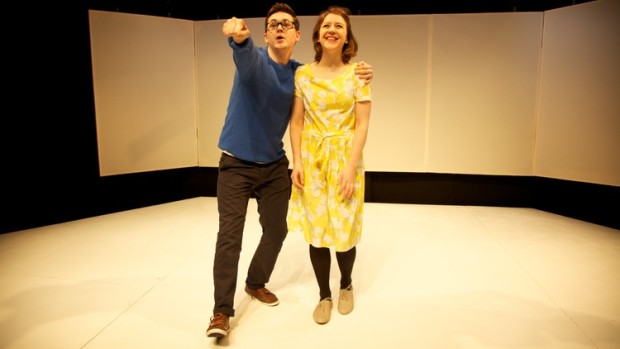You have no items in your cart. Want to get some nice things?
Go shopping
Who’d be a parent? Perhaps the age-old question should be “Who’d be a literary parent?” Certainly, a trawl through the annals of literature throws up any number of characters the world might have been better off without – many of them with a complicated relationship to their mothers and fathers. From Oedipus and Electra to contemporary plays like Tracy Letts’ August: Osage County and Sam Holcroft’s Rules for Living (which recently opened in the National’s Dorfman Theatre), writers have long mined the fraught arena of familial relations for drama, and often at the centre we’ll find a mother and father trying to understand and support their offspring.
Another playwright who keeps returning to the concept of parents and children is Philip Ridley, whose scintillating and regularly challenging plays are often built on the foundation of family. He has moved from the vanished parents serving as a backdrop and possible explanation for the action in The Pitchfork Disney, through the brothers returning to their dead mother’s house in Piranha Heights, and has now come to rest on a play that revolves around a young mum and dad and their desire to create a better life for themselves and “for Baby”: the darkly hilarious Radiant Vermin, currently on at the Soho Theatre.
Choosing an alternative route to that of many children’s authors (of which Ridley can be counted too), rather than rendering parents deceased or absent, Ridley this time presents us with a female protagonist who is pregnant throughout the majority of the action and couples her with an anxious yet devoted father-to-be. As the consistently likeable (which should perhaps be more of a stretch considering some of their behaviour during the play!) central couple Ollie and Jill, Gemma Whelan and Sean Michael Verey paint a strong picture of two young people whose bond has been cemented by the imminent arrival of their offspring. While Radiant Vermin operates very successfully as a damning commentary on the housing market and the economy in general, the focus on family and the lengths we will go to in order to secure a safe and happy future for our relatives is far from secondary. We are never allowed to forget that Ollie and Jill have convinced themselves that they are acting selflessly and in the best interests of Baby, whether it’s Jill shying away from some of the more violent acts described by her husband as she is worried about the effect it will have on her child, or both characters pondering how they will manage to keep up the necessary “renovations” when they have an extra mouth to feed. It’s impossible to discuss the play without ruining a key plot point so please look away now if you’re spoiler-squeamish. Early on in Radiant Vermin, Ollie and Jill enter into a Faustian pact in the form of a housing contract with Miss Dee, played with lip-smacking glee and sly glances to the audience by Amanda Daniels. They will be given a dream home without the need for a mortgage or administration fees, but they will have to decorate it themselves. As it transpires, the most effective way to do so is to murder an exponentially increasing number of the homeless, without their neighbours noticing.
This deliciously nasty premise allows Ridley to point a critical finger at mortgage brokers and a society that leaves those most in need of housing without it. Our sympathy is entirely with this young family, and we are even asked at one point if we agree with the path Ollie and Jill have embarked upon. By depicting two people who are very easy to side with – much of the humour of the piece arises from their navigation of everyday married life and their respective approaches to looking after their home – Ridley perhaps sets himself, and the audience, less of a challenge than he has been known to do in the past. My mind went back to his earlier drama The Fastest Clock in the Universe: while we do come to feel a great deal of sympathy for Sherbet Gravel (like Jill, visibly pregnant) and Foxtrot Darling, the young parents at the heart of this wickedly tragic play, at first they seem hopelessly naïve (Foxtrot) and annoyingly abrasive and oblivious (Sherbet). It’s only once we have learned more about the life they want for themselves and their baby (ringing any bells?) that we truly feel the horrible impact of what happens at the conclusion of the piece. Personally I’ve seen few things more chilling on stage than Sherbet Gravel’s joyous boasts about “the future one” turning into a plaintive whimper as her dreams collapse around her.
Ridley shows us, as many playwrights have before him, that the trials of parenthood are guaranteed to put us through the emotional wringer. While the National Theatre’s production of Medea last year may have been a little uneven in quality, I doubt many would deny the power of Helen McCrory’s titular performance, very clearly going through psychological hell as a murderous mother. Arthur Miller, whose realist plays about the family are a cornerstone of American literature, returned time and again to parents and children: Willy and Linda Loman in Death of a Salesman are arguably the best-known and most affecting example, but the Kellers in All My Sons and the Carbones in A View from the Bridge can have just as shattering and profound an impact on audiences in the right hands, as the Young Vic revival of the latter play starring the immensely talented Mark Strong and Nicola Walker has proven. The riveting tale of Martha and George in Edward Albee’s brilliant Who’s Afraid of Virginia Woolf? also hinges on a child – their son, who may be dead or alive or just about anything in between. Their arguments and cruel games are given weight by the often-unspoken emotional burden of having been, or perhaps being, parents.
It sometimes seems as if becoming a parent is an inevitable road to misery, if literature is anything to go by. Thankfully there’s a not-insignificant list of happy parents to contradict that notion – Atticus Finch in To Kill A Mockingbird (regularly adapted for the stage), Caractacus Potts in the beloved musical Chitty Chitty Bang Bang and even non-human characters like Mufasa in The Lion King spring to mind. And although Ollie and Jill have to go through some unpleasant events to get there, it seems at the end of Radiant Vermin that they are pleased to have had their baby. It’s a surprisingly upbeat conclusion for the notoriously hard-hitting Ridley, and combined with the incredible performances from the Soho Theatre cast (particularly in the penultimate segment, in which Whelan and Verey take on the mammoth task of switching between characters at their son’s birthday party at a hurtling rate) it makes for Ridley’s most purely entertaining and funny show to date. But it’s anyone’s guess what peculiar offspring he’ll conjure up next.
Radiant Vermin continues at the Soho Theatre until April 12.

About Michael Reffold
Michael is a graduate of Lancaster University, with a Master's in European Languages and Cultures following swiftly on from a BA in English Literature and Creative Writing. He loves all aspects of theatre – both watching and performing, being a keen amateur actor. He is currently a Senior Editorial Assistant at BioMed Central and a casual duty manager for Theatres Trust.




